USDOT Thriving Communities Program: Waukegan, IL
15 minutes Date Launched/Enacted: Mar 11, 2024 Date Published: May 22, 2024
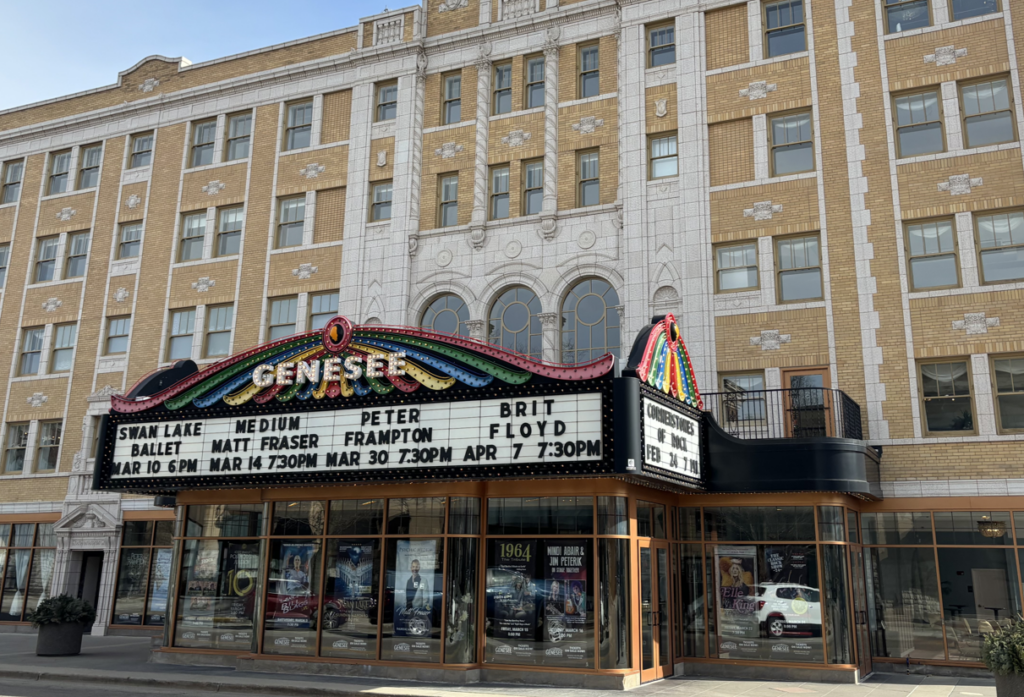
About the Thriving Communities Program
The Thriving Communities Program funds tailored technical assistance to under-resourced and disadvantaged communities, helping them better access historic infrastructure investments and deliver transformative projects. The US Department Of Transportation (USDOT) FY 2022 Thriving Communities Program supports 64 communities across the country with access to a team of capacity builders to develop innovative community engagement methods, identify funding opportunities, and grow long-term capacity to develop and deliver transportation projects that strengthen communities.
TCP Complete Neighborhoods Community of Practice
TCP Communities are grouped into three Communities of Practice: Main Streets, Networked Communities, and Complete Neighborhoods. The 15 communities included under the Complete Neighborhoods Community of Practice are:
| Atlantic Beach, SC | Isabela, PR | Santa Cruz, CA |
| Billings, MT | Lansing, MI | St. Louis County, MO |
| Decatur, IL | Lima, OH | Suffolk, NY |
| East Orange, NJ | Providence, RI | Sumter, SC |
| Indianapolis, IN | Roanoke, VA | Waukegan, IL |
USDOT selected a Capacity Builder team led by RMI, including: the American Council for Energy-Efficient Economy (ACEEE), Equitable Cities, Nelson\Nygaard, and the Shared-Use Mobility Center (SUMC), to provide technical assistance to these 15 communities.

A Snapshot of Waukegan, Illinois
Waukegan, Illinois, one of the communities selected under the Complete Neighborhoods Community of Practice, is a city in northeastern Illinois on the coast of Lake Michigan, approximately 40 miles north of Chicago. The city prospered as a key industrial hub in the 19th century, and the construction of a railway through the city in the mid-1800s stimulated its growth and development, bringing with it a large population growth. Waukegan is now home to nearly 90,000 residents, many of them working class. In recent years, Waukegan has transitioned away from heavy industrial uses along its lakefront, and the area now has a mixed industry base, which includes large manufacturing, pharmaceutical, entertainment and hospitality, and healthcare sectors, as well as a naval station. However, accompanying this transition, many of its communities have undergone economic and environmental upheaval. Over 15% of Waukegan’s residents live in poverty, and the city’s median household income of $58,844 is lower than the median for both Illinois ($80,306) and the United States ($74,580). In total, roughly half of the census tracts that fall within Waukegan and North Chicago, Waukegan’s neighbor to the south, are designated as Historically Disadvantaged, per USDOT.
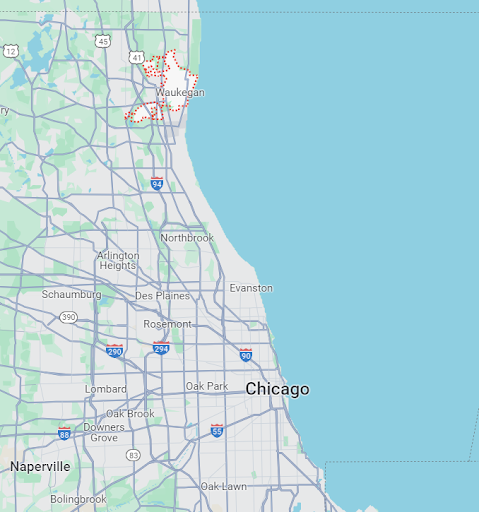
Location of Waukegan within the Chicago Metropolitan Area. Source: Google Maps
Key Initiatives for Transportation
Through the Thriving Communities Program, Waukegan hopes to advance several major longstanding initiatives:
The Sheridan Road/Amstutz Expressway Feasibility Study
The Sheridan Road/Amstutz Expressway is a 2.9 mile north-south freeway that bisects Waukegan, cutting off its downtown district and several nearby neighborhoods from the lakefront.
The feasibility study will focus on this area and determine how best to transform and develop the road into a safe and connected corridor. For more information on the Amstutz Expressway, see the 2003 Lakefront Downtown Master Plan and the 2020 Comprehensive Land Use Plan in the Related Resources section below.

Map of the Amstutz Expressway. Credit: Google Maps
The Northern Lakeshore Trail Connectivity Plan (NLTCP)
The NLTCP envisions an interconnected network of bike and pedestrian trails, connecting Waukegan and four other nearby cities. This plan serves to make the area more interconnected, more friendly to bicycle and pedestrian transportation, and safer for all travelers. For more information on the NLTCP, see the plan document below in the Related Resources section.
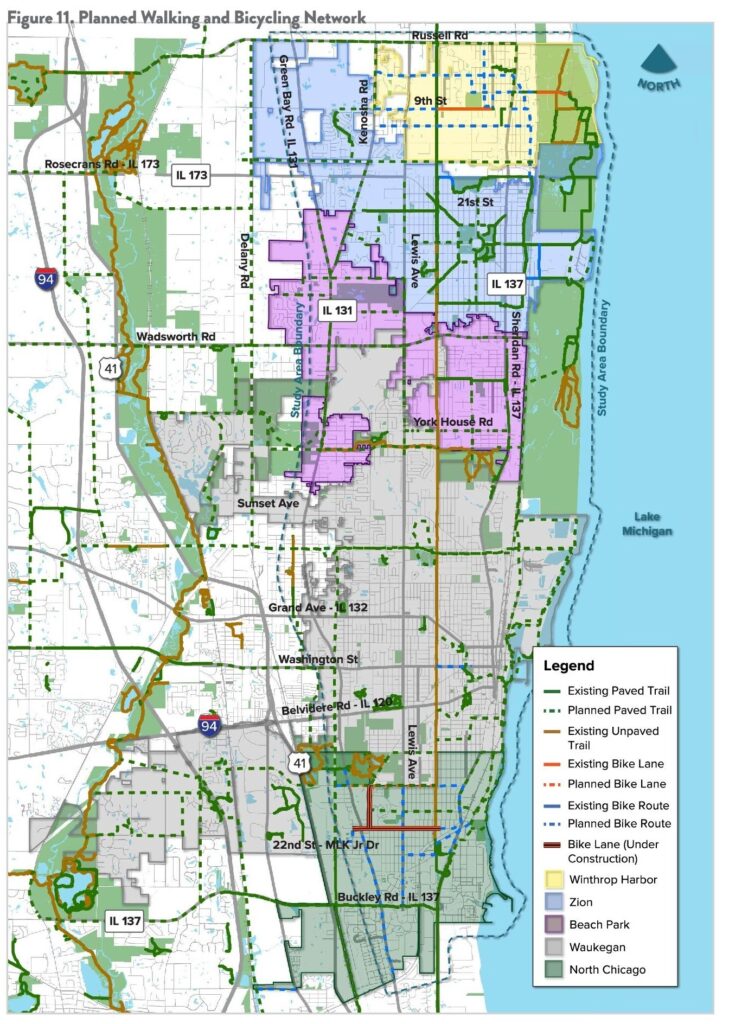
Planned bike and pedestrian trail network from the NLTCP. Credit: CMAP
Community Engagement
In addition to the above initiatives, the City of Waukegan hopes to bolster its community engagement strategy, but currently it faces unique challenges with building community support. The city has a large population of historically marginalized and underserved residents, the majority of which are Latino, and faces a general lack of trust from the community, which poses a major barrier to many projects. The Thriving Communities Capacity Buildier team is working closely with the City of Waukegan to explore ways to build trust, incorporate community input, and foster effective and meaningful engagement.
Key Partners
Waukegan is working with several key partners on these initiatives. Some of these partners include:
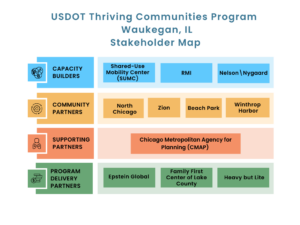
Stakeholder Map. Credit: SUMC.
Activities through the Thriving Communities Program
Needs Assessment
The Thriving Communities Capacity Builder team led an in-depth needs assessment with the City of Waukegan in 2023 to learn about the community and its needs and drive technical assistance activities. This needs assessment was intended to allow representatives from Waukegan to expand on some of the community’s ongoing projects, challenges, and relationships with local community partners. Among the insights gained through this process were a need to foster meaningful community partnerships to help promote trust between the City and its residents, and a desire to build political and community support for long-term projects so that they are better suited to withstand any potential political administration shifts or changes in priority.
Site Visit
In February 2024, members of the Capacity Builder team visited Waukegan to meet with city officials, explore project sites, and facilitate conversations with key community stakeholders to further community engagement efforts. This visit provided the Capacity Builder team an opportunity to tour locations related to Waukegan’s initiatives. Some of these sites included sections of the Amstutz Expressway, Waukegan’s lakefront, the Washington Street Corridor, and the Robert McClory trail. Through this visit, the Capacity Builder team was able to get a firsthand account of the conditions of these sites and get a better understanding of how infrastructure investments could be directed to improve the city.
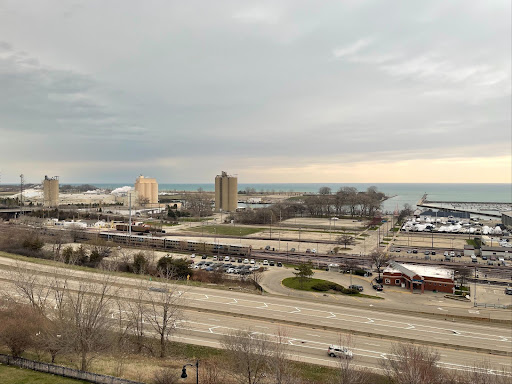
View of the Amstutz Expressway, Waukegan’s Metra station, and Waukegan Harbor. Credit: SUMC
The above picture, taken on a weekday morning (about 10:00am) from Waukegan’s downtown, shows how the Amstutz Expressway is a physical barrier between the downtown area, the Wauekgan Metra station and parking lot, and Lake Michigan. Waukegan’s lakefront has mixed uses, with both industrial (left) and recreational (right) facilities. Note the low traffic volume on the expressway (this portion of the Amstutz Expressway has an annual average daily traffic of 5,750). Also note the lack of pedestrian crossings to access the Metra station in the image. The closest pedestrian walkway is out of frame to the right (south).
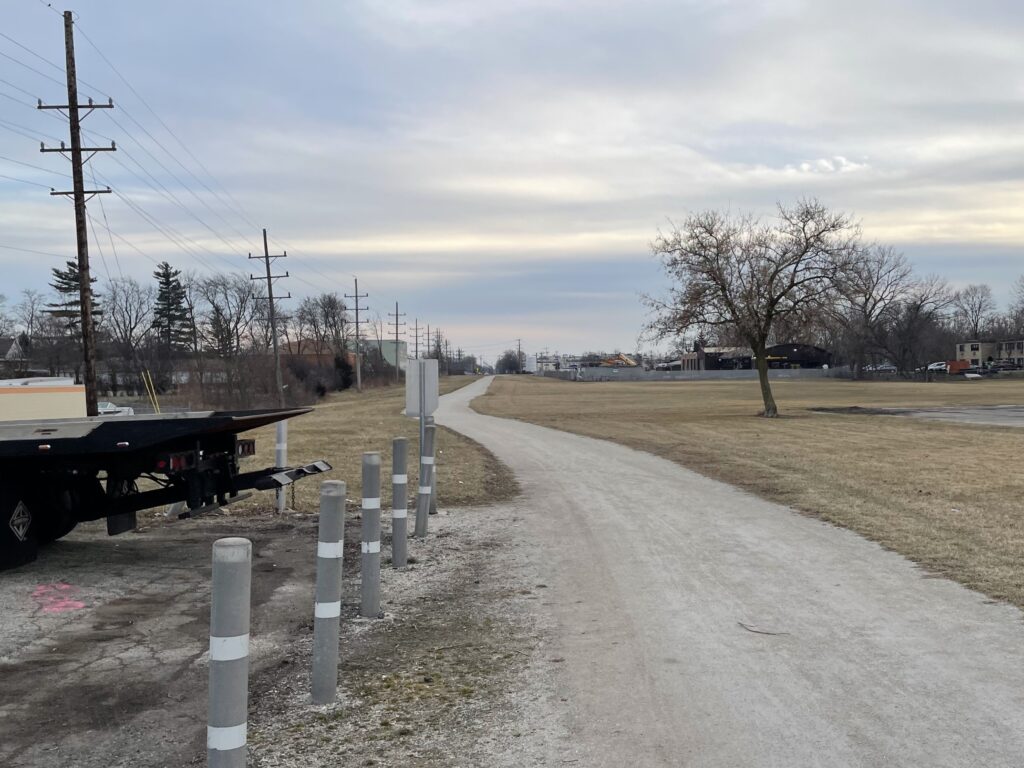
View of the Robert McClory Trail at Washington Street looking south. Credit: SUMC
Stakeholder Meetings
During the February 2024 site visit, the Thriving Communities Capacity Builder team along with Waukegan city officials connected with local community leaders from a variety of community-based organizations. Through these one-on-one meetings, Waukegan city officials and the Thriving Communities Capacity Builder team learned more about these organizations’ priorities, goals, and initiatives, and explored how they aligned with some of Waukegan’s. Over the course of the conversations, it became clear that many community members recognized the barrier to economic development posed by the current state of the Amstutz Expressway. However, many also noted the importance of addressing all barriers to access, not just physical barriers. Stakeholder meetings are ongoing, and these in-person conversations were just one step towards long-term collaborative relationships with community members.
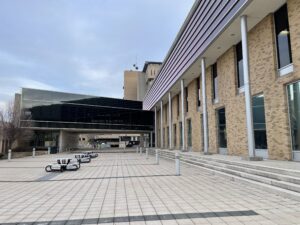
Waukegan City Hall, where most of the stakeholder meetings took place. Credit: SUMC.
Feasibility Studies
As part of the City of Waukegan’s efforts to improve safety and accessibility, it is using direct funds from the TCP program to work with engineering firm Epstein Global to develop feasibility studies to reimagine key corridors in areas around the city. These feasibility studies include exploring a shared-use path on Keller Avenue, a major thoroughfare running north-south through the city to determine how best to transform and develop the road into a safe and connected corridor, as well as a pedestrian bridge across Sheridan Road. For these studies, the firm analyzed existing conditions based on aerial imagery, GIS data, and traffic behavior. The completed studies include plans, cost estimates, and tools for the city to move forward with these improvements. These efforts will contribute to major transportation enhancements for people traveling around the city.
Community Engagement
The Capacity Builder team supported the City of Waukegan in building a partnership with local community organization Family First Center of Lake County to support the Unity in the Community series, a community-building initiative designed to promote unity and anti-violence through engaging events featuring food, activities, and music. The series aims to unite Waukegan’s residents, fostering dialogue, collaboration, and a stronger connection to the city’s natural spaces. The initiative includes planning and executing events that not only bring community members together, but also highlight some of Waukegan’s transportation plans and goals. By creating opportunities for meaningful community engagement, the initiative supports the goals of the Thriving Communities Program, educating residents about ongoing transportation projects and strengthening partnerships between the City of Waukegan and its community members.

Waukegan city staff interacting with residents at a Unity in the Community event in March, 2025. Credit: SUMC
The program has also worked with Waukegan-based videography company Heavy but Lite, LLC in creating and distributing educational videos designed to support community engagement in Waukegan. These videos will provide residents with clear, accessible information about the city’s current transportation initiatives to enhance safety, connectivity, and overall quality of life. Each video will detail project objectives, anticipated outcomes, and opportunities for residents to provide feedback and actively participate in the planning process. Heavy but Lite, LLC will help foster a well-informed and engaged community by simplifying complex information and showcasing key initiatives such as road diets, the Amstutz Expressway reimagining, and the Northern Lakeshore Trail Connectivity Plan. These videos aim to amplify Thriving Communities Program’s goal to build local capacity and promote meaningful community engagement by enhancing public understanding and encouraging active participation in the city’s transformative efforts. By highlighting Waukegan’s transportation initiatives and their potential impact, the videos will empower residents with the knowledge and tools necessary to support infrastructure development and compete for federal funding.
To help bolster community involvement on a regular basis, the Capacity Builder team developed a guidebook for launching a Community Advisory Board (CAB) for transportation. A CAB is a city-managed forum composed of community members, community-based organizations, and other key community stakeholders who provide feedback on various projects or issues. Through a CAB, a community can share local knowledge and lived experience to ensure that the city’s work is guided by a robust understanding of the community towards effective research, programming and policymaking. Waukegan will be able to use this guide to form a CAB to help inform future transportation projects, strengthen its transportation planning process, and foster meaningful community involvement to benefit all Waukeganites.
Funding Opportunities
The Capacity Builder team is working with the City of Waukegan to identify suitable funding opportunities to help the city support its initiatives. This process includes leveraging new funding programs that have emerged from the Infrastructure Investment and Jobs Act (IIJA) of 2021, exploring other opportunities from regional and state sources, and various federal agencies, including USDOT, Department of Housing and Urban Development, Environmental Protection Agency, and others. This collaborative effort incorporates local and regional partners in addition to the City of Waukegan and the Capacity Builder team.
With support from the TCP Capacity Builder team, Waukegan was awarded a FY2024 Safe Streets and Roads for All grant from USDOT. The award will go to implement temporary, targeted intersection safety improvements, like flexposts, signage, and paint in various locations throughout Waukegan. These small-scale demonstration projects will focus on using quick-build strategies to evaluate pedestrian safety, reallocate roadway space, and inform permanent safety-oriented projects in the future.
Demonstration projects are especially valuable for helping communities identify the most effective improvement. If an aspect of the installation doesn’t work well or the community expresses concerns, it can be adjusted and redefined before permanent installation, ensuring the final installation is more closely aligned with community input and better addresses their needs.
The Capacity Builder team also supported Waukegan in applying for other federal grants, including the Better Utilizing Investments to Leverage Development (BUILD) grant program (formerly RAISE) and the Reconnecting Communities Program (RCP), with the goal of leveraging these funds to address the challenges of the Amstutz Expressway and explore potential strategies for improvement. Although the RAISE and RCP applications were unsuccessful, the support provided by the Capacity Builder team contributed to making the process a valuable opportunity for Waukegan to refine its vision for an improved corridor and foster strong partnerships with stakeholders who can support future efforts to secure funding.
Infrastructure Renderings
To prepare for future capital and implementation funding opportunities, Nelson\Nygaard from the Capacity Builder team is developing renderings of key corridors and locations in Waukegan that could be enhanced with bicycle and pedestrian improvements. These renderings will highlight potential engineering improvements that could be implemented to enhance safety for vulnerable users and improve connectivity.
The renderings developed through this effort will help communicate details about ongoing initiatives in Waukegan and strengthen future grant applications aimed at securing funding for bicycle and pedestrian infrastructure improvements. These visual aids serve as valuable tools to illustrate the project and help residents understand how the proposed improvements could impact their daily lives.
Amstutz Expressway Workshop
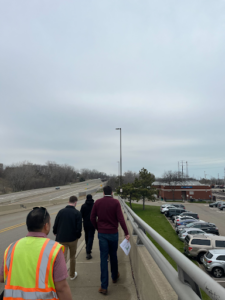
Workshop participants walk along an onramp to the Amstutz Expressway. Credit: SUMC
In April 2025, the Capacity Builder team organized a workshop to connect Waukegan city staff with state, regional, and local stakeholders to explore the Amstutz Expressway and Waukegan’s lakefront. The workshop brought together officials from the Illinois Department of Transportation, Illinois Department of Natural Resources, CMAP, and various city departments to examine the current conditions of the corridor and explore opportunities to redevelop the area and improve connections in the city. Workshop participants learned about the history of the corridor and Waukegan’s long-term initiatives and were able to observe firsthand through a walking tour how the road acts as a barrier to lakefront access and downtown business development. Afterwards, the group convened for a facilitated discussion on how Waukegan can improve safety in the area, access funding opportunities, and focus its efforts for both long-term and short-term improvements. Efforts to reimagine this corridor require the cooperation of agencies, departments, and other stakeholders from various jurisdictions, and this workshop gave Waukegan an opportunity to convene some of these key audiences to move these plans forward.
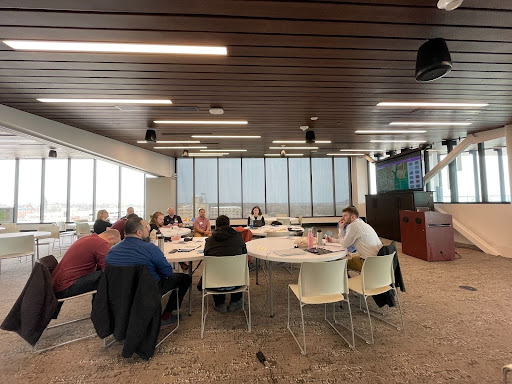
Workshop participants discuss the Amstutz Corridor. Credit: City of Waukegan
Sharing Lessons Learned
The Capacity Building Team is working to share insights and lessons learned from the work with Waukegan through TCP at various conferences and forums. The Capacity Building Team also has plans to showcase TCP work with Waukegan at the Transport Chicago conference in June 2025 and the Illinois Chapter of the American Planning Association State Conference in October 2025.
Related Resources
- Waukegan’s 2020 Comprehensive Land Use Plan
- Northern Lakeshore Trail Connectivity Plan
- Washington Street Commercial Corridor Plan
- Waukegan’s 2003 Lakefront Downtown Master Plan
- Lake County News Sun Article: Waukegan, North Chicago Studying Potential Sheridan Road Improvements
- A Snapshot of the Amstutz Expressway
Key Partners
- Chicago Metropolitan Agency for Planning (CMAP): CMAP is the regional planning agency for northeastern Illinois, including Waukegan and North Chicago. CMAP has been working with Waukegan and its partners on several initiatives, including the Amstutz Expressway and NLTCP projects.
- The City of North Chicago: North Chicago is a city of just over 30,000 people directly south of Waukegan. North Chicago is a major part of the Amstutz Expressway project and the NLTCP. North Chicago and Waukegan are the largest communities in the region but need more capacity to advance these projects.
- Epstein Global: Epstein is a Chicago-based multi-disciplinary design and construction company focused on serving clients, empowering employee owners, and enhancing our communities.
- Family First Center of Lake County: is a Waukegan-based community organization that provides wraparound services for families to address challenges such as drugs, crime, and violence by providing counseling, resources, and services to help empower families living through tough situations.
- Nearby communities: In addition to the City of North Chicago, other nearby communities are also involved in the NLTCP. These cities include Beach Park, Zion, and Winthrop Harbor.
- Local community organizations and other entities: To address the gap in community engagement, Waukegan is partnering with various nonprofit organizations, government agencies, and other entities serving the area to develop strategies to bolster community outreach and involvement.
Capacity building efforts through the Thriving Communities program are continuing until May 2025. The Capacity Builder team will conduct more technical assistance activities and will update this case study as the program progresses.